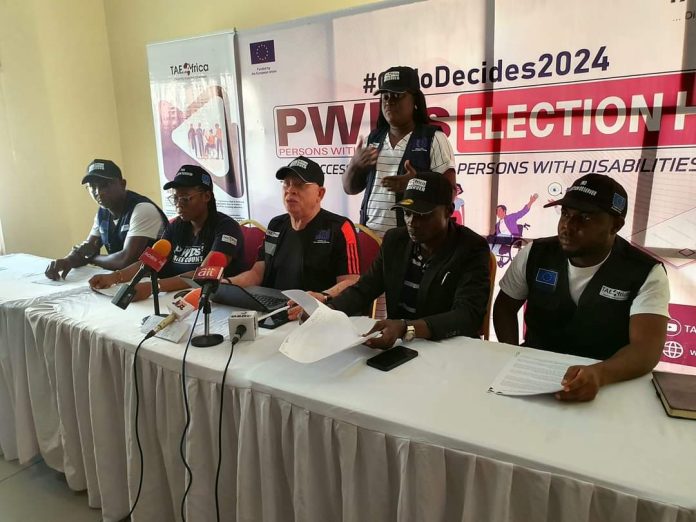The 2024 Ondo State Governorship Election, held on Saturday, November 16, has sparked a renewed conversation about Nigeria’s commitment to inclusive democratic processes. TAF Africa, a leading advocacy organization championing the rights of Persons with Disabilities (PWDs), has raised serious concerns about the level of inclusivity and accountability observed during the election. In a detailed post-election statement issued on Sunday, November 17, 2024, TAF Africa highlighted systemic failures that hindered the participation of PWDs while proposing actionable recommendations to address these gaps.
The Election and TAF Africa’s Observers
TAF Africa deployed a robust team comprising 20 stationary citizen observers and 5 roving media observers to monitor polling units with registered PWD voters. Guided by Section 54 of the Electoral Act, which mandates the deployment of assistive tools and prioritization of PWD voters, the organization assessed the inclusivity of the electoral process. Despite the peaceful conduct of the election, the findings from TAF Africa’s observers reveal disturbing realities that call into question Nigeria’s readiness to uphold the rights of marginalized groups during elections.
Key Findings: Barriers to Electoral Inclusivity
1. Rampant Vote Buying
TAF Africa observers documented alarming levels of vote buying at several polling units. At St. David Primary School in Ijomu, Akure South, voters were reportedly handed coupons by party agents, which were ticked after confirming their votes. Monetary rewards were then disbursed at designated spots. Such acts not only undermine the integrity of the electoral process but also erode public trust in democratic institutions.
2. Inadequate Deployment of Assistive Tools
Despite the legal mandate for inclusive electoral practices, critical assistive tools such as Braille ballot guides and magnifying glasses were glaringly absent in many polling units. Notable examples include polling units at St. Thomas Church 1 in Akure South and Oke-Emeso Ward 5 Unit 008. Blind voters had no choice but to rely on assisted voting, compromising their right to privacy and independence.
3. Limited Use of Form EC40H
Form EC40H, essential for documenting PWD voter data, was either missing or not utilized in multiple polling units, including those in Ward 5 Units 008, 22, and 28 in Akure North. This failure undermines efforts to accurately represent PWD participation and plan for future elections.
4. Denial of Priority Voting
While priority voting was implemented in some polling units, inconsistencies were rampant. In Ward 6, Oba Ile, Akure North, a voter with albinism was initially denied priority voting until TAF Africa observers intervened. Similarly, in Ode Irele’s Ward 2 Polling Unit 4, a physically disabled voter had to wait for the queue to thin out before casting their vote.
5. Accessibility Challenges
Instances of polling unit inaccessibility were noted, such as in Oke-Igbo 1 Polling Unit 13, where a little person could not independently insert their ballot paper due to the height of the ballot box. In another instance, an elderly voter with physical disabilities faced mobility challenges due to the absence of transportation and long distances to polling units.
6. Low Voter Turnout
Voter apathy was evident, with low turnout recorded across the state. This trend raises concerns about citizens’ confidence in the electoral process and the inclusivity of the system.
7. Security Concerns
TAF Africa observers reported incidents of ballot box snatching, particularly in Ofosu/Onisere Ward, Idanre LGA. Such acts of electoral violence disproportionately affect vulnerable groups, including PWDs, deterring their participation in elections.
TAF Africa’s Recommendations
In light of these findings, TAF Africa has outlined a series of recommendations aimed at fostering a more inclusive and accountable electoral system:
For INEC:
- Ensure Full Deployment of Assistive Tools: Braille ballot guides, magnifying glasses, and Form EC40H must be consistently provided in polling units with registered PWDs.
- Strengthen Training for Election Officials: Officials must be trained to prioritize PWD voters and enforce compliance with disability-inclusive provisions.
- Combat Vote Buying: Enhanced monitoring and stricter enforcement mechanisms are crucial to curbing this menace.
- Improve Polling Unit Infrastructure: Redesign polling units to ensure accessibility, including ramps and height-adjustable ballot boxes.
For Government and Policymakers:
- Accessible Transportation: Develop systems to ease mobility for PWDs and the elderly on election days.
- Stronger Electoral Laws: Enforce stricter penalties for non-compliance with disability inclusion mandates.
For Civil Society and Development Partners:
- Voter Mobilization: Educate PWDs about their rights and encourage participation in elections.
- Monitoring Compliance: Regularly assess electoral processes against disability inclusion standards.
For Political Parties:
- Support PWD Candidates: Provide mentorship and funding to boost the representation of PWDs in governance.
- Reject Electoral Malpractices: Discourage vote trading and other unethical behaviors.
For Security Agencies:
- Address Electoral Violence: Investigate and prosecute those involved in ballot box snatching and voter intimidation.
For the Media:
- Amplify PWD Voices: Spotlight challenges and successes of PWD voters to raise awareness and drive systemic change.
The Road Ahead
While the Ondo Governorship Election showcased some commendable efforts, such as occasional priority voting, TAF Africa’s findings underscore the urgent need for systemic reforms to uphold the principles of equity and accessibility. The organization has reaffirmed its commitment to advocating for inclusive electoral processes, urging all stakeholders to make disability inclusion a cornerstone of democratic integrity.
As Nigeria prepares for future elections, the call for inclusive governance cannot remain a distant ideal. It is a moral and legal imperative that must be addressed with urgency.
“The time for action is now,” stated Amb. Jake Epelle, CEO and Founder of TAF Africa, as he concluded the organization’s post-election report.
The ball is now in the court of electoral stakeholders to rise to the occasion and ensure that no Nigerian, regardless of ability, is left behind in the democratic process.


